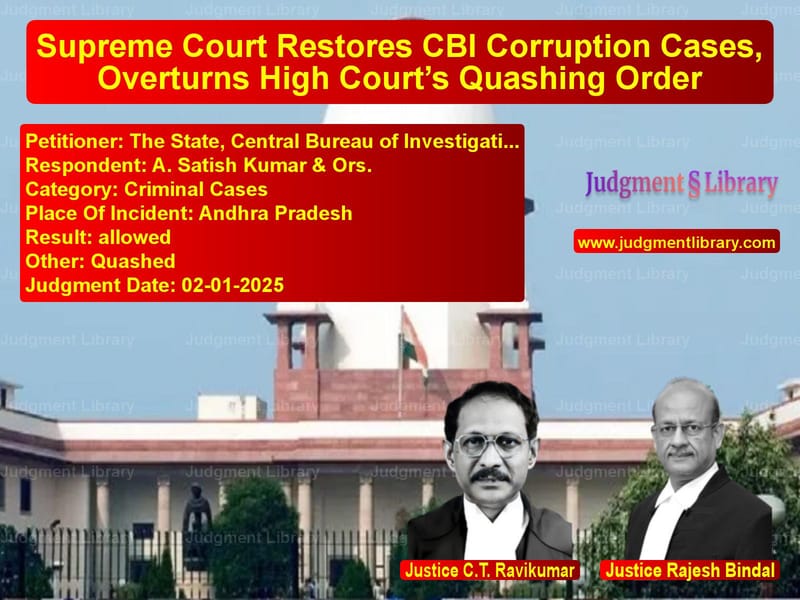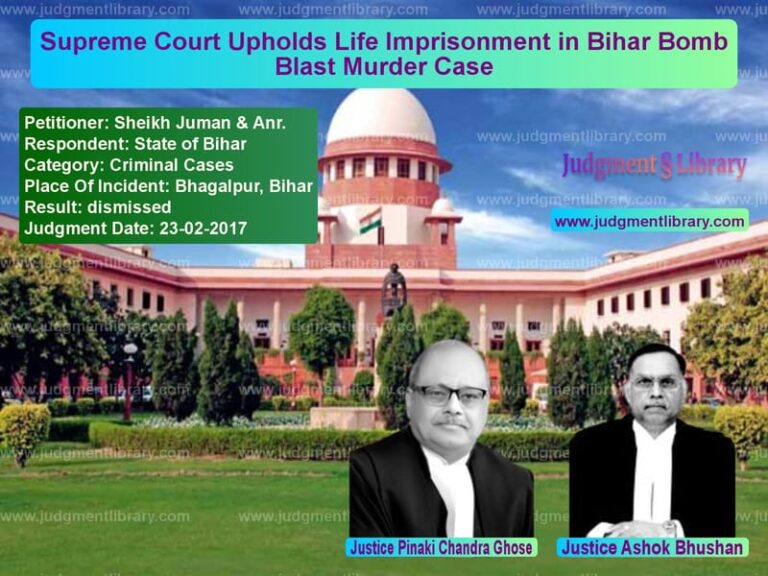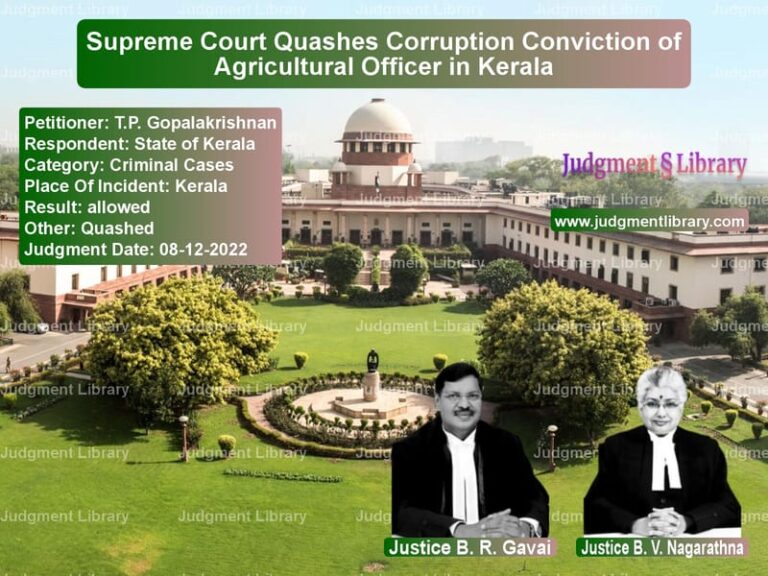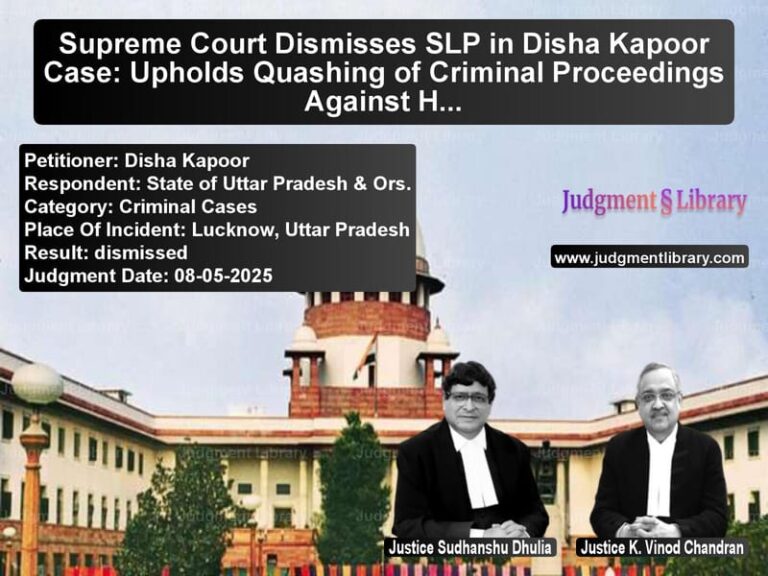Supreme Court Restores CBI Corruption Cases, Overturns High Court’s Quashing Order
The Supreme Court of India has reinstated corruption cases investigated by the Central Bureau of Investigation (CBI) against two government officials, overturning an Andhra Pradesh High Court judgment that quashed the FIRs and charge sheets on jurisdictional grounds. The ruling in The State, Central Bureau of Investigation v. A. Satish Kumar & Ors. clarifies the CBI’s jurisdictional authority in cases involving central government employees, particularly after the bifurcation of Andhra Pradesh in 2014.
Background of the Case
The case concerns two separate corruption cases against central government employees:
- A. Satish Kumar: A Superintendent in the Central Excise Department, accused of demanding and accepting a ₹10,000 bribe for issuing a license surrender certificate.
- Challa Sreenivasulu: An Accounts Assistant in the South Central Railway, accused of taking a ₹15,000 bribe for processing contract bills.
The CBI registered two FIRs under Section 7 of the Prevention of Corruption Act, 1988, investigated the cases, and filed charge sheets before the Special CBI Court in Hyderabad. The cases were numbered CC No.2/2018 and CC No.6/2018.
Legal Challenges and High Court Decision
- The accused challenged the FIRs before the Andhra Pradesh High Court, arguing that the CBI lacked jurisdiction since the alleged crimes took place in Andhra Pradesh, while the FIRs were registered in Telangana.
- They contended that after the bifurcation of Andhra Pradesh in 2014, CBI needed fresh consent from the Andhra Pradesh government under Section 6 of the Delhi Special Police Establishment (DSPE) Act, 1946.
- The High Court ruled in favor of the accused, quashing the FIRs and charge sheets, stating that the absence of specific consent from the Andhra Pradesh government rendered the investigations unlawful.
Arguments by the Petitioner (CBI)
- The CBI argued that a general consent had been granted by the undivided Andhra Pradesh government in 1990, and it continued to be valid post-bifurcation.
- It cited Circular Memo No.13665/SR/2014, which stated that all laws applicable to the undivided state would continue unless expressly repealed.
- The agency contended that as the accused were central government employees, no state consent was required for their prosecution.
- The CBI relied on Supreme Court precedents, including Kanwal Tanuj v. State of Bihar and Fertico Marketing and Investment Pvt. Ltd., which upheld the CBI’s jurisdiction over central government employees without state consent.
Arguments by the Respondents (Accused Officials)
- The accused claimed that the CBI’s territorial jurisdiction ended with the bifurcation of Andhra Pradesh, requiring fresh state consent.
- They argued that Andhra Pradesh had not issued new consent under Section 6 of the DSPE Act after 2014.
- They contended that all proceedings, including the transfer of cases from Hyderabad to Visakhapatnam and then to Kurnool, were legally flawed.
Supreme Court’s Observations
- “Section 6 of the DSPE Act does not restrict CBI from investigating central government employees, irrespective of where the alleged crime occurred.”
- “The Andhra Pradesh Reorganization Act and subsequent legal orders ensure the continuity of pre-existing legal frameworks, including the 1990 general consent for CBI investigations.”
- “The High Court erred in concluding that the CBI lacked jurisdiction, as the agency was empowered under both central laws and specific government notifications.”
- “The transfer of cases from Hyderabad to Visakhapatnam and later to Kurnool was a procedural step that did not vitiate the investigation or prosecution.”
Legal Principles Applied
- The Supreme Court reiterated that CBI does not require state consent to investigate central government employees.
- The Court emphasized that consent granted before the bifurcation of a state continues unless explicitly revoked.
- The ruling relied on the precedent in Sharad Birdhichand Sarda v. State of Maharashtra, which established that procedural irregularities must not obstruct substantial justice.
Final Judgment
- The Supreme Court set aside the High Court’s order quashing the FIRs.
- It restored CC No.13/2022 and CC No.15/2022 before the Special CBI Court in Kurnool.
- The trial court was directed to proceed with the cases in accordance with the law.
Conclusion
This ruling clarifies that pre-existing legal frameworks continue post-bifurcation and reaffirms the CBI’s authority to investigate central government employees. The decision ensures that corruption cases are not dismissed on procedural grounds, preserving the integrity of anti-corruption enforcement.
Petitioner Name: The State, Central Bureau of Investigation.Respondent Name: A. Satish Kumar & Ors..Judgment By: Justice C.T. Ravikumar, Justice Rajesh Bindal.Place Of Incident: Andhra Pradesh.Judgment Date: 02-01-2025.
Don’t miss out on the full details! Download the complete judgment in PDF format below and gain valuable insights instantly!
Download Judgment: the-state,-central-b-vs-a.-satish-kumar-&-or-supreme-court-of-india-judgment-dated-02-01-2025.pdf
Directly Download Judgment: Directly download this Judgment
See all petitions in Fraud and Forgery
See all petitions in Bail and Anticipatory Bail
See all petitions in Judgment by C.T. Ravikumar
See all petitions in Judgment by Rajesh Bindal
See all petitions in allowed
See all petitions in Quashed
See all petitions in supreme court of India judgments January 2025
See all petitions in 2025 judgments
See all posts in Criminal Cases Category
See all allowed petitions in Criminal Cases Category
See all Dismissed petitions in Criminal Cases Category
See all partially allowed petitions in Criminal Cases Category







